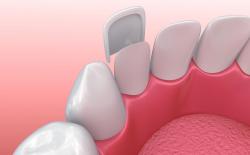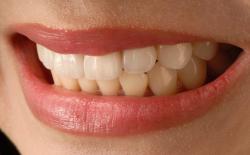What is zirconia?
Thanks to its many great properties, zirconium-dioxide - usually called zirconia - is widely used in dentistry.
Zirconia is a highly biocompatible, esthetic, extremely durable, and 100% metal-free material.
Not only veneers, but crowns, bridges, and even implants are made of zirconia.
A properly manufactured and fitted zirconia restoration not only looks great but can last for decades.
Advantages of zirconia veneers
- Zirconia is extremely durable, it's very rare to see a chipped or fractured zirconia veneer.
- Comes in a wide range of shades, it can match the shade of your natural teeth.
- If you are after a really white "Hollywood smile", then zirconia is the material to choose.
- Suitable for people with darker teeth. Unlike other veneers, e.g. E-Max, zirconia can completely hide the dark shade of your tooth.
- It is possible to manufacture ultra-thin zirconia veneers (0.2-0.3 mm), which require little or no tooth preparation before fitting.
- Thanks to its extreme toughness, zirconia is suitable for people with bruxism.
- Zirconia is stain resistant, it's unlikely to stain even if you drink coffee or red wine often.
Disadvantages of zirconia veneers
- Fitting zirconia veneers is not easy. It requires some experience and a special protocol must be followed, that is different from the methods and materials used when fitting other types of veneers. Actually, this step has a significant effect on the lifetime of your veneer and might justify the higher price of an experienced dentist.
- Once zirconia veneers are fitted, it's not easy to adjust them. It is important to make sure your bite is correct and your veneers will look perfectly. A wax model after a digital dental scan can show you how your veneers will look like. This definitely worths the extra cost.
Zirconia lumineers
Since zirconia is very tough, it is possible to make very thin (~0.3mm) zirconia veneers.
Such thin veneers might require no tooth preparation before fitting, i.e. no enamel needs to be removed, therefore they are often referred to as lumineers or no-prep veneers.
Lumineers are not for everyone, but if your dentist says you are a good candidate for lumineers, you should consider choosing them instead of traditional veneers. They are not only tooth-saving, but the procedure is usually more affordable and faster compared to traditional veneers.
How long do zirconia veneers last?
On average the lifetime of a zirconia veneer is around 5-10 years.
However, zirconia is the most durable material that is used to make veneers. Such veneers are extremely unlikely to chip or break.
So if the lab and your dentist did everything perfectly and you maintain good oral hygiene, a zirconia veneer can last significantly longer, 20-30 years is quite possible.
How much do zirconia veneers cost?
The typical price of a zirconia veneer is around $1,000 - $2,000, usually more expensive than other types of veneers. Lumineers or no-prep veneers might be a bit more affordable.
Fitting the perfect zirconia veneer is all about quality and experience, which comes at a price. Some factors that might drive the price up:
- Experience of the dentist: Fitting zirconia veneers is not easy, a dentist specialized in this procedure might charge you more.
- Experience of the lab: Zirconia rarely chips or breaks. If this happens, the reason might be low-quality lab work (or bruxism or chewing hard foods, like ice). An experienced lab will not only make high-quality products but will also make sure that your veneers look great.
- Wax model: Doing a digital scan and building a wax model of your teeth, so that you can see exactly how your new smile will look certainly increases the price. However, as mentioned above, adjusting an already fitted zirconia veneer can be a real challenge, so it probably worths the extra cost.
Frequently asked questions
Are zirconia veneers better than porcelain?
Porcelain veneers look even more natural than zirconia. However, porcelain is not as durable as zirconia, these veneers are more likely to chip or fracture.
If you are a grinder, porcelain is definitely not for you.
Do zirconia veneers stain?
Coffee, red wine, and cigarettes are the most likely to stain restoration. However, zirconia has great stain resistance, your veneers should stay white even if you drink or smoke.
Even if you see some staining on the veneers that cannot be removed with a toothbrush, a dentist should be able to remove it.
Can I get zirconia veneers if I have metal allergy?
Yes, zirconia is a metal-free restoration, allergic reactions are very very rare.
Should I use whitening toothpaste if I have zirconia veneers?
You can if you want to. However, make sure that your zirconia veneers do not have a porcelain coating, as whitening toothpastes can damage the porcelain.
Can zirconia veneers be whitened?
Once they are fitted, they cannot be whitened. Since zirconia veneers come in many shades, you need to make sure you choose the right shade before the veneers are fitted.
You might also be interested in:
E-Max Veneers
E-Max veneers are a great alternative to zirconia. They look more natural but are less durable.
Lumineers
Lumineers or no-prep veneers require no reduction of your enamel. This makes them very popular among patients.
Porcelain Veneers
Porceain veneers are the most beautiful looking veneers. However chipping or cracking are a bit more common.


